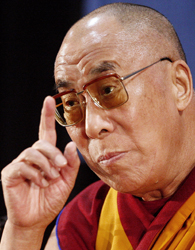Tenzin Gyatso was recognized as the 14th Dalai Lama at the age of 2. He has been serving as Tibet’s political leader since age 16, and has been in exile since he was 24. Now in his 70s, he continues his efforts to spread peace and work for a free Tibet.
Becoming the Dalai Lama
Tenzin Gyatso was born Lhamo Thondup (or Llhamo Döndrub) on July 6, 1935, to a family of farmers in the small village of Taktser in a northeastern province of what was then Tibet.
After the 13th Dalai Lama passed away, the Regent of Tibet went to a lake known to show visions of the future. It was with these visions that lamas and dignitaries went around the country to locate the reincarnation of the 13th Dalai Lama. They were led to the home of the then 2-or-3-year-old Lhamo Thondup.
According to the Office of His Holiness the Dalai Lama, the boy could correctly identify the lamas by name. The lamas showed him a collection of items, several of which belonged to the 13th Dalai Lama; young Lhamo identified each of the Dalai Lama’s items, saying, “It’s mine, It’s mine.”
This, along with other tests, led Buddhist officials to declare Lhamo Thondup to be the reincarnation of the 13th Dalai Lama and the spiritual leader of Tibet.
Sources in this Story
- The Office of His Holiness The Dalai Lama: The Dalai Lama
- Encyclopedia Britannica: Dalai Lama XIV
- The Nobel Foundation: The 14th Dalai Lama
- NPR: Congress, Bush Give Dalai Lama Gold Medal
- The BBC: Profile: The Dalai Lama
The Dalai Lama in Exile
Lhamo was enthroned in February 1940 at Potala Palace. He was soon inducted as a monk and given the name Jamphel Ngawang Lobsang Yeshe Tenzin Gyatso. He was sent to be educated at a monastery while the Regent maintained political control over Tibet.
In 1949-50, Mao Zedong’s Chinese troops invaded Tibet and tried to incorporate it into China. In 1950, the Dalai Lama assumed political power over Tibet and began to attempt peace negotiations with China.
In 1959, the same year that the Dalai Lama finished his final exams and earned the equivalent of a doctorate in Buddhist philosophy, Tibetans revolted against Zedong’s army and many protesters were killed. The 24-year-old Dalai Lama left the country to become political leader-in-exile; thousands of Tibetans followed.
Once in exile, the Dalai Lama worked tirelessly to promote the principles of Buddhist philosophy and work toward a free Tibet. He began working with the United Nations to help protect the people of Tibet in exile and drafted a constitution for Tibetans in exile that focused on freedom of speech, belief and assembly.
In 1987, he presented his Five Point Peace Plan for Tibet in an effort to map out a workable strategy to ending the conflict in the country. The plan included transforming Tibet into a place of peace, stopping China’s population transfer policies, protecting the environment of Tibet, stopping nuclear weapons production in the country, and starting real negotiations between Tibet and China to reach a peaceful resolution. The Dalai Lama has also been a promoter of a “middle way” in which Tibet could become an autonomous entity within China.
He has toured the world promoting peace through non-violent means. In 1989, the 14th Dalai Lama was awarded the Nobel Prize for Peace.
In his Nobel lecture, he declared, “Peace, in the sense of the absence of war, is of little value to someone who is dying of hunger or cold. It will not remove the pain of torture inflicted on a prisoner of conscience. It does not comfort those who have lost their loved ones in floods caused by senseless deforestation in a neighboring country. Peace can only last where human rights are respected, where the people are fed, and where individuals and nations are free.”
The Office of His Holiness The Dalai Lama features collections of the Dalai Lama’s speeches, teachings and audio webcasts.
The Dalai Lama Today
According to his Web site, the Dalai Lama wishes to one day live as an ordinary citizen of a free Tibet, and plans, when Tibet is free, to transfer his political power to the interim government of the country.
For now, as he lives in exile, he continues to travel the world promoting peace. He has received numerous awards, honors and honorary degrees for his work. The Dalai Lama has also met with leaders of other religions in an attempt to help unify different religions.
In 2007 the United States bestowed the Congressional Gold Medal on the Dalai Lama for his work advocating a peaceful resolution with China over Tibet; the medal is the highest civilian award that Congress can give.
The Dalai Lama has been accused by Chinese officials of being an instigator of uprising, such as in the case of uprisings in Tibet’s capital city in 2008. He has also faced criticism from young Tibetans who believe that his non-violent approach is ineffective.
Answering this criticism, the Dalai Lama says, “It is difficult to achieve a meaningful outcome by sacrificing lives. The path of non-violence is our irrevocable commitment and it is important that there be no departure at all from this path.”











